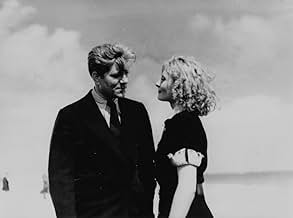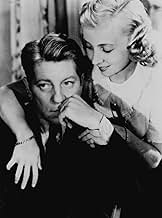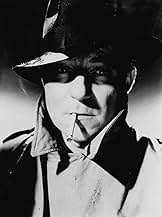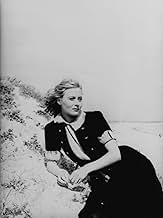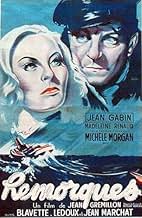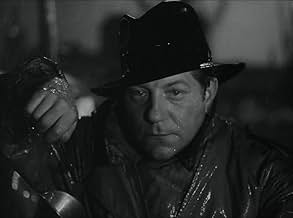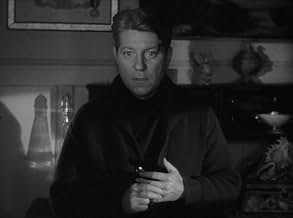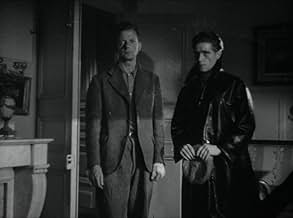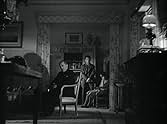Remorques
- 1941
- Tous publics
- 1h 31m
IMDb RATING
7.2/10
1.7K
YOUR RATING
The captain of the tugboat Cyclone, André Laurent, rushes off to save the Mirva. He abandons his sick wife Yvonne and the couple celebrating their marriage. In the early morning, the Cyclone... Read allThe captain of the tugboat Cyclone, André Laurent, rushes off to save the Mirva. He abandons his sick wife Yvonne and the couple celebrating their marriage. In the early morning, the Cyclone tugs the Mirva ashore with Catherine aboard.The captain of the tugboat Cyclone, André Laurent, rushes off to save the Mirva. He abandons his sick wife Yvonne and the couple celebrating their marriage. In the early morning, the Cyclone tugs the Mirva ashore with Catherine aboard.
Madeleine Renaud
- Yvonne Laurent
- (as Madeleine Renaud de la Comédie Francaise)
Charles Blavette
- Gabriel Tanguy
- (as Blavette)
Jean Dasté
- Le radio
- (as Jean Daste)
René Bergeron
- Georges
- (as Bergeron)
Henri Poupon
- Le docteur Maulette
- (as Poupon)
Marcel Pérès
- Le Meur
- (as Perez)
Marcel Duhamel
- Pierre Poubennec
- (as Duhamel)
Henri Pons
- Roger
- (as Pons)
Léonce Corne
- Un invité à la noce
- (uncredited)
Lucien Coëdel
- Un marin du 'Cyclope'
- (uncredited)
Henri Crémieux
- L'administrateur
- (uncredited)
Featured reviews
There are films whose production could be a good subject for a film script. One of these cases seems to me to be 'Remorques' (the English distribution title was 'Stormy Waters'). The director of this film was Jean Grémillon, a very interesting filmmaker, a documentarist and a musician as well, an artist involved in the anti-Nazi resistance but also the author of several films produced and distributed during the occupation. These films could be the subject of a case study on the art of cinema under conditions of occupation and war, on the boundaries between dignity and collaboration under conditions of censorship. 'Remorques' is one of them. Filming began in the summer of 1939 and was interrupted by the outbreak of war, when Jean Gabin and other members of the film crew were called up in the army. Continuing in 1940, filming was interrupted again with the fall of Paris, to be completed in 1941. The film was first distributed in occupied France, with the approval of German censorship, although its stars, Jean Gabin and Michèle Morgan had meanwhile taken refuge in America. The international premiere did not take place until after the war, in 1946. Beyond this interesting history, 'Remorques' is a film with many qualities that make it stand the test of time and remain relevant over 80 years after its production.
The screenplay written by André Cayatte and Jacques Prévert, who adapted a novel by Roger Vercel for the screen, offers us a story that takes place on the ocean and on the shores of the (Atlantic) ocean which plays an important role. André Laurent, the film's main hero, is the captain of a tugboat which rescues and tows boats in distress during storms on the ocean. In such a situation, he meets Catherine, the wife of the captain of another ship, who decides to leave her husband. The romance that develops between André and Catherine endangers André's career as a seafarer dedicated to saving others and the marriage to his faithful wife Yvonne.
The romantic story is quite banal, but the film is interesting because of the way it is conceived visually and, of course, by the presence of two of the most formidable French actors of that period. Jean Gabin and Michèle Morgan had already worked together in Marcel Carné's 'Le quai des brumes' and the producers bet correctly by casting the two actors in the main roles. It is fascinating to this day to watch the way close-ups are used to make the characters' feelings cross the screen and the magnetism between them in the scenes where they are together. Jean Grémillon was a very interesting filmmaker, with experience in documentary films. Some of the scenes are shot on real boats and they convey authenticity and drama. The original intention was for most of the filming to take place at sea, but for various reasons, some of the action scenes had to be produced in the studio with miniature models. Too bad. On the other side we can admire the use of mobile cameras in the scenes on the beach or in the city of Brest. Here Grémillon anticipates techniques that would become basic instruments in the toolkits of New Wave directors two decades later. 'Remorques' is a film that bears the mark of the period in which it was made, but which manages to boldly combine cinematic genres. Although made in difficult conditions, it is solid and interesting enough to still be worth watching today.
The screenplay written by André Cayatte and Jacques Prévert, who adapted a novel by Roger Vercel for the screen, offers us a story that takes place on the ocean and on the shores of the (Atlantic) ocean which plays an important role. André Laurent, the film's main hero, is the captain of a tugboat which rescues and tows boats in distress during storms on the ocean. In such a situation, he meets Catherine, the wife of the captain of another ship, who decides to leave her husband. The romance that develops between André and Catherine endangers André's career as a seafarer dedicated to saving others and the marriage to his faithful wife Yvonne.
The romantic story is quite banal, but the film is interesting because of the way it is conceived visually and, of course, by the presence of two of the most formidable French actors of that period. Jean Gabin and Michèle Morgan had already worked together in Marcel Carné's 'Le quai des brumes' and the producers bet correctly by casting the two actors in the main roles. It is fascinating to this day to watch the way close-ups are used to make the characters' feelings cross the screen and the magnetism between them in the scenes where they are together. Jean Grémillon was a very interesting filmmaker, with experience in documentary films. Some of the scenes are shot on real boats and they convey authenticity and drama. The original intention was for most of the filming to take place at sea, but for various reasons, some of the action scenes had to be produced in the studio with miniature models. Too bad. On the other side we can admire the use of mobile cameras in the scenes on the beach or in the city of Brest. Here Grémillon anticipates techniques that would become basic instruments in the toolkits of New Wave directors two decades later. 'Remorques' is a film that bears the mark of the period in which it was made, but which manages to boldly combine cinematic genres. Although made in difficult conditions, it is solid and interesting enough to still be worth watching today.
The making of "Remorques" began in 1939,as a follow-up to the excellent "l'étrange Monsieur Victor",and because of the Occupation,was released two years later.That also explains the length of the movie (hardly 80 minutes in the broadcast versions).
It's a simple story:the plot involves a tough sailor,Gabin,torn between two women ,the frail Madeleine Renaud,Gremillon's favorite actress (she was featured in all of his four movies of the 1938-1943 period),and the disillusioned Michèle Morgan (with whom he had teamed up in Carné's famous "quai des brumes").
The banal plot matters much less than the atmosphere;the star of the movie is the Ocean:you can hear,feel or see it ceaselessly along the viewing.This ocean which nobody can tame,which breaks willpower.For man must work and woman must weep..
SPOILERS: The ending climaxes the movie.A distraught incredulous Gabin gazes at his dead wife whilst a lugubrious siren desperately wails there down by the ocean.Then the man,forgetting his plight,walks across the harbor to come to the rescue of the boat in distress:you can hear voices chanting prayers for the dead as he makes his way through darkness .This ending has the strength of an epic Victor Hugo poem.
It's a simple story:the plot involves a tough sailor,Gabin,torn between two women ,the frail Madeleine Renaud,Gremillon's favorite actress (she was featured in all of his four movies of the 1938-1943 period),and the disillusioned Michèle Morgan (with whom he had teamed up in Carné's famous "quai des brumes").
The banal plot matters much less than the atmosphere;the star of the movie is the Ocean:you can hear,feel or see it ceaselessly along the viewing.This ocean which nobody can tame,which breaks willpower.For man must work and woman must weep..
SPOILERS: The ending climaxes the movie.A distraught incredulous Gabin gazes at his dead wife whilst a lugubrious siren desperately wails there down by the ocean.Then the man,forgetting his plight,walks across the harbor to come to the rescue of the boat in distress:you can hear voices chanting prayers for the dead as he makes his way through darkness .This ending has the strength of an epic Victor Hugo poem.
... from screenwriter Jacques Prevert and director Jean Gremillon. Jean Gabin stars as Andre Laurent, a rescue tugboat captain living and working in a stormy seaside village. He's 10 years married to the pleasant Yvonne (Madeleine Renaud), but he's become a bit bored and complacent with their union. On his latest rescue outing, his crew brings aboard a woman from a stranded ship. Her name is Catherine (Michele Morgan), and she's very unhappy in her marriage with the other ship's captain, a sleazy crook that she has grown to detest. Despite their better judgement, Andre and Catherine begin seeing each other.
Gabin is my favorite actor in French cinema, and this film is another example of why, as he deftly assays his role with a naturalism and honesty that eschews big showy moments but still ably projects the necessary emotion for the scene. Renaud is also good as the fragile wife, and Morgan is outstanding as the woman trapped in terrible circumstances. Director Gremillon shots a number of scenes in a visually striking manner, although the excessive use of obvious miniatures in the ships-at-stormy-seas scenes takes one out of the action a bit. Still, for a film shot over a period of three years due to a world war interrupting things, it's remarkable they accomplished what they did. Recommended.
Gabin is my favorite actor in French cinema, and this film is another example of why, as he deftly assays his role with a naturalism and honesty that eschews big showy moments but still ably projects the necessary emotion for the scene. Renaud is also good as the fragile wife, and Morgan is outstanding as the woman trapped in terrible circumstances. Director Gremillon shots a number of scenes in a visually striking manner, although the excessive use of obvious miniatures in the ships-at-stormy-seas scenes takes one out of the action a bit. Still, for a film shot over a period of three years due to a world war interrupting things, it's remarkable they accomplished what they did. Recommended.
No denying the magnificent, moody visuals are done with mastery. Gabin and Morgan are commanding in their roles as always. Supporting cast similarly excellent. Makes it clear from the beginning that it's a moody film, unlikely to end in the bright light of castles. And carries through that tone with grace. Human emotions often cause melodrama and tragedy. Sometimes, all we can do is carry on with what we know best. We had a nice detour; we make our decisions in life, though, and sometimes that's that. It was fun to live in fantasy for a while, but real life snapped us back and it's back to the grind. Poetic realism defined.
Title: An always vexing choice, "Stormy Waters" is the altered title chosen, rather than the original French "Remorques", which refers to the boat tuggers or trailers used for sea rescues, such as protagonist Captain André's "Cyclone".
Title: An always vexing choice, "Stormy Waters" is the altered title chosen, rather than the original French "Remorques", which refers to the boat tuggers or trailers used for sea rescues, such as protagonist Captain André's "Cyclone".
Seas cover seven tenths of the terrestrial globe and have inspired painters, writers, composers and not a few film-makers and this adaptation of a novel by Roger Vercel is one of the very best of its type.
Considered by the French to be among their most gifted directors, Jean Grémillon is fated to be little known abroad except to a coterie of cinéphiles. He had envisioned a far more realistic storm sequence to be filmed in Brittany but this was deemed impracticable for health and safety reasons and he was obliged to shoot in UFA's studios at Billancourt. Nonetheless this sequence still comes off pretty well. Filming came to a grinding halt with the outbreak of war and it was not completed and released until 1941 by which time its two stars had gone to Hollywoodland.
Navigating the stormy waters of desire are Jean Gabin and Michéle Morgan, one of Cinema's most memorable couples. On-screen chemistry is hard to define but their deep fondness for each other off-screen is evident whilst her ethereal quality is perfectly allied to his earthiness. As his wife is Madeleine Renaud who was later to star in Grémillon's excellent but underrated 'Le Ciel est a vous'. Renowned as a stage actress her sporadic appearances in film represent quality over quantity. Fernand Ledoux makes the most of a thankless role and if you blink you'll miss an uncredited Alain Cuny.
Stunning cinematography by one of his nation's finest, Armand Thirard, powerful score by Roland-Manuel whilst at the insistence of Grémillon and Gabin, the screenplay has been entrusted to Jacques Prévert whose poetic/realist style is perfectly suited to this tale of doomed love and the forces of Nature.
Grémillon's ambitious projects were constantly thwarted by the constraints of commercial cinema but his comparatively small output is a legacy to be treasured.
Considered by the French to be among their most gifted directors, Jean Grémillon is fated to be little known abroad except to a coterie of cinéphiles. He had envisioned a far more realistic storm sequence to be filmed in Brittany but this was deemed impracticable for health and safety reasons and he was obliged to shoot in UFA's studios at Billancourt. Nonetheless this sequence still comes off pretty well. Filming came to a grinding halt with the outbreak of war and it was not completed and released until 1941 by which time its two stars had gone to Hollywoodland.
Navigating the stormy waters of desire are Jean Gabin and Michéle Morgan, one of Cinema's most memorable couples. On-screen chemistry is hard to define but their deep fondness for each other off-screen is evident whilst her ethereal quality is perfectly allied to his earthiness. As his wife is Madeleine Renaud who was later to star in Grémillon's excellent but underrated 'Le Ciel est a vous'. Renowned as a stage actress her sporadic appearances in film represent quality over quantity. Fernand Ledoux makes the most of a thankless role and if you blink you'll miss an uncredited Alain Cuny.
Stunning cinematography by one of his nation's finest, Armand Thirard, powerful score by Roland-Manuel whilst at the insistence of Grémillon and Gabin, the screenplay has been entrusted to Jacques Prévert whose poetic/realist style is perfectly suited to this tale of doomed love and the forces of Nature.
Grémillon's ambitious projects were constantly thwarted by the constraints of commercial cinema but his comparatively small output is a legacy to be treasured.
Did you know
- TriviaThe film's production was heavily disrupted by the Second World War. Filming started in July 1939 but was interrupted on 3 September due to France declaring war on Germany, with director Jean Grémillon and lead actor Jean Gabin being mobilized. With a special permission granted, shooting resumed on 6 May 1940 but was interrupted again in June with the German army at the gates of Paris, leading producer Joseph Lucachevitch to flee to the USA while assistant director Louis Daquin and editor Marcel Cravenne took the film reels to the south of France, in Marseille and Pau. Filming resumed for the final time under German occupation in 1941, despite both lead actors Jean Gabin and Michèle Morgan having fled to the USA and concluded on 2 September, with some planned scenes having never been shot.
- ConnectionsEdited into Spisok korabley (2008)
- How long is Stormy Waters?Powered by Alexa
Details
- Release date
- Country of origin
- Official site
- Language
- Also known as
- Stormy Waters
- Filming locations
- Production companies
- See more company credits at IMDbPro
- Runtime
- 1h 31m(91 min)
- Color
- Aspect ratio
- 1.37 : 1
Contribute to this page
Suggest an edit or add missing content

